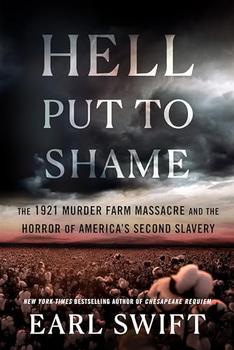
The 1921 Murder Farm Massacre and the Horror of America's Second Slavery
by Earl Swift
From the acclaimed New York Times bestselling author of Chesapeake Requiem comes a gripping new work of narrative nonfiction telling the forgotten story of the mass killing of eleven Black farmhands on a Georgia plantation in the spring of 1921—a crime that exposed for the nation the existence of "peonage," a form of slavery that gained prominence across the American South after the Civil War.
On a Sunday morning in the spring of 1921, a small boy made a grim discovery as he played on a riverbank in the cotton country of rural Georgia: the bodies of two drowned men, bound together with wire and chain and weighted with a hundred-pound sack of rocks. Within days a third body turned up in another nearby river, and in the weeks that followed, eight others. And with them a deeper horror: all eleven had been kept in virtual slavery before their deaths. In fact, as America was shocked to learn, the dead were among thousands of Black men enslaved throughout the South in conditions nearly as dire as those before the Civil War.
Hell Put to Shame tells the forgotten story of that mass killing and of the revelations about peonage, or debt slavery, that it placed before a public self-satisfied that involuntary servitude had ended at Appomattox more than fifty years before.
By turns police procedural, courtroom drama, and political exposé, Hell Put to Shame also reintroduces readers to three Americans who spearheaded the prosecution of John S. Williams, the wealthy plantation owner behind the murders, at a time when white people rarely faced punishment for violence against their Black neighbors. The remarkable polymath James Weldon Johnson, newly appointed the first Black leader of the National Association for the Advancement of Colored People, marshaled the organization into a full-on war against peonage. Johnson's lieutenant, Walter F. White, a light-skinned, fair-haired, blue-eyed Black man, conducted undercover work at the scene of lynchings and other Jim Crow atrocities, helping to throw a light on such violence and to hasten its end. And Georgia governor Hugh M. Dorsey won the statehouse as a hero of white supremacists—then redeemed himself in spectacular fashion with the "Murder Farm" affair.
The result is a story that remains fresh and relevant a century later, as the nation continues to wrestle with seemingly intractable challenges in matters of race and justice. And the 1921 case at its heart argues that the forces that so roil society today have been with us for generations.
"Propulsive… .The ease of reading Swift's efficient prose belies its elegance… .This is a must-read." —Publishers Weekly (starred review)
"A gripping, memorable work that wholly confronts a hellish past that continues to bleed into the present. ...This unflinching narrative will make readers examine not only America's dark history, but also the disheartening parallels that exist today." —Kirkus Reviews (starred review)
"Hell Put to Shame is a powerfully unsettling portrait of both the single most savage episode in the long decades of savagery inflicted by white southerners on their black neighbors in the 20th century—and the methodical process that followed to erase those crimes from America's collective memory." —Douglas A. Blackmon, author of Slavery by Another Name, winner of the Pulitzer Prize
"Here is a 1920s tale of a serial murderer whose long record of civil rights cruelties and grotesque crimes was matched only by the steadfast bravery of a few individuals who peered into the depths and could take no more. If Killers of the Flower Moon could somehow be fused with The Devil in the White City and Django Unchained, you might get some idea of the scope of the evil that Earl Swift has so carefully documented in chilling and enraging detail, much of it rendered in incredibly vivid scenes of courtroom drama." —Hampton Sides, New York Times bestselling author of Hellhound On His Trail
This information about Hell Put to Shame was first featured
in "The BookBrowse Review" - BookBrowse's membership magazine, and in our weekly "Publishing This Week" newsletter. Publication information is for the USA, and (unless stated otherwise) represents the first print edition. The reviews are necessarily limited to those that were available to us ahead of publication. If you are the publisher or author and feel that they do not properly reflect the range of media opinion now available, send us a message with the mainstream reviews that you would like to see added.
Any "Author Information" displayed below reflects the author's biography at the time this particular book was published.
Earl Swift is the author of the New York Times bestseller Chesapeake Requiem, which was named to ten best-of-the-year lists. His other books include Across the Airless Wilds, Auto Biography, The Big Roads, and Where They Lay. A former reporter for the Virginian-Pilot and a contributor to Outside and other publications, he is a fellow of Virginia Humanities at the University of Virginia. He lives in the Blue Ridge mountains west of Charlottesville.




Only when we are no longer afraid do we begin to live
Click Here to find out who said this, as well as discovering other famous literary quotes!
Your guide toexceptional books
BookBrowse seeks out and recommends the best in contemporary fiction and nonfiction—books that not only engage and entertain but also deepen our understanding of ourselves and the world around us.